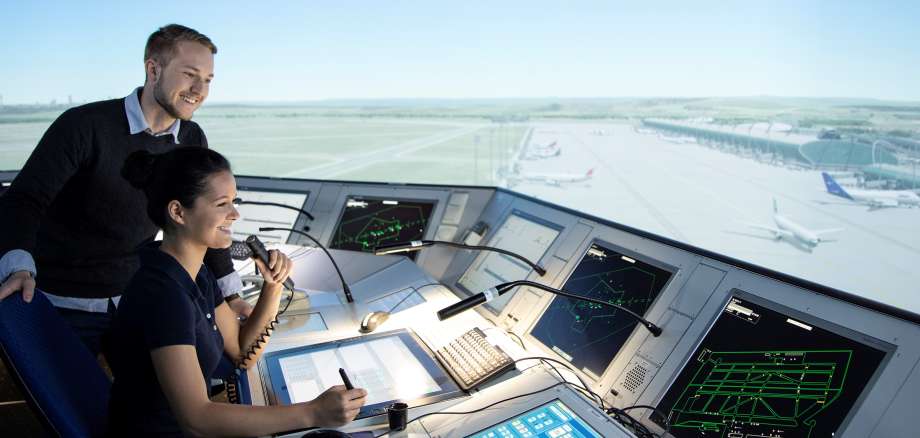The aviation industry is recovering and DFS, the German air navigation service provider, is responding by training more air traffic controllers to meet the forecast upturn in demand. School-leavers are also being sought to start dual courses of study in IT and engineering. In 2021, 110 trainees and dual students are being recruited, with the number rising to 150 next year.
Air traffic volumes are staging a comeback following the slump caused by the COVID-19 pandemic. At the beginning of the year, traffic volumes were one third of the pre-pandemic levels. By the end of the year, DFS expects volumes to rise to 75 percent. "If air traffic volumes have fully rebounded by the middle of the decade, we need to be in a position to do the job expected of it," explained Dirk Mahns, Chief Operating Officer (COO) on the DFS Executive Board. That is why DFS will be raising the number of air traffic controller training positions in the coming year.
By the middle of this decade, many air traffic controllers will be leaving DFS for age-related reasons. DFS is responding by expanding its training programme. In 2022, DFS will recruit around 130 trainees, who will undergo the classical training path to becoming an air traffic controller in Germany. Traditionally, the first 12 to 15 months of the three-year training period are completed at the DFS Air Navigation Services Academy in Langen, near Frankfurt, Germany. After that, they move to one of the DFS branches across Germany for on-the-job training. In addition, DFS offers air traffic controller training as part of a dual course of studies in cooperation with the University of Applied Sciences Worms, where trainees complete a bachelor's degree at the same time as they do their air traffic controller training. In the coming year, 10 places will be on offer in Worms.
"Being an air traffic controller is an exciting profession"
DFS air traffic controllers work either in the control tower at one of the 15 designated international airports in Germany or in one of the four radar control centres across the country. At these locations, they ensure that aircraft take off and land safely and that they always maintain sufficient separation from each other in the air.
"Being an air traffic controller is an exciting profession. Controllers have a lot of responsibility and no two working days are the same," said Dr Kerstin Böcker, Chief Human Resources Officer (CHRO) on the DFS Executive Board. "DFS offers applicants attractive compensation and secure long-term career prospects."
Candidates wishing to become air traffic controllers can apply to DFS if they have a school-leaving qualification that entitles them to attend university (Allgemeine Hochschulreife, if you attended the German school system), are not older than 24 years, and have a good command of English and an excellent command of German. Applicants need to be willing to work across Germany and be prepared to do shift work.
In doing their jobs, air traffic controllers are supported by engineers and IT specialists. These specialists look after and maintain systems and ensure the safe functioning of the complex air traffic control technology. In addition, they work on innovative technical solutions in the DFS research centre, such as the climate-friendly design of individual flight profiles.
More information on the internet
On the DFS careers site (karriere.dfs.de, also available in English), DFS provides detailed information about its training and study options. Potential candidates can get a direct insight into the day-to-day work of the trainees on the DFS Instagram account (dfs_campuswelt) or on the DFS trainee blog (dfs-azubiblog.de, only available in German). Online events provide potential applicants with all the information they need on the job profiles available and on DFS as an employer. All those interested can ask questions in direct exchange with trainees and trainers.
Downloads
Media contact:
Kristina Kelek
Telephone: +49 (0)6103 707-4161
E-mail: presse@dfs.de
DFS Deutsche Flugsicherung GmbH, the German air navigation service provider, is a State-owned company under private law with 5,600 employees as at 30 June 2021. DFS ensures the safe and punctual flow of air traffic over Germany. Before 2020, around 2,200 air traffic controllers guided up to 10,000 flights in German airspace every day, more than 3 million movements every year. The company operates control centres in Langen, Bremen, Karlsruhe and Munich as well as control towers at the 15 designated international airports in Germany. The subsidiary DFS Aviation Services GmbH markets and sells products and services related to air navigation services, and provides air traffic control at nine regional airports in Germany and at London Gatwick Airport and Edinburgh Airport in the UK. R. Eisenschmidt GmbH is another DFS subsidiary which markets publications and products for General Aviation. Kaufbeuren ATM Training (KAT) is responsible for training military air traffic services personnel. DFS has been working on the integration of drones into air traffic since 2016 and has set up a joint venture, Droniq GmbH, with Deutsche Telekom.
